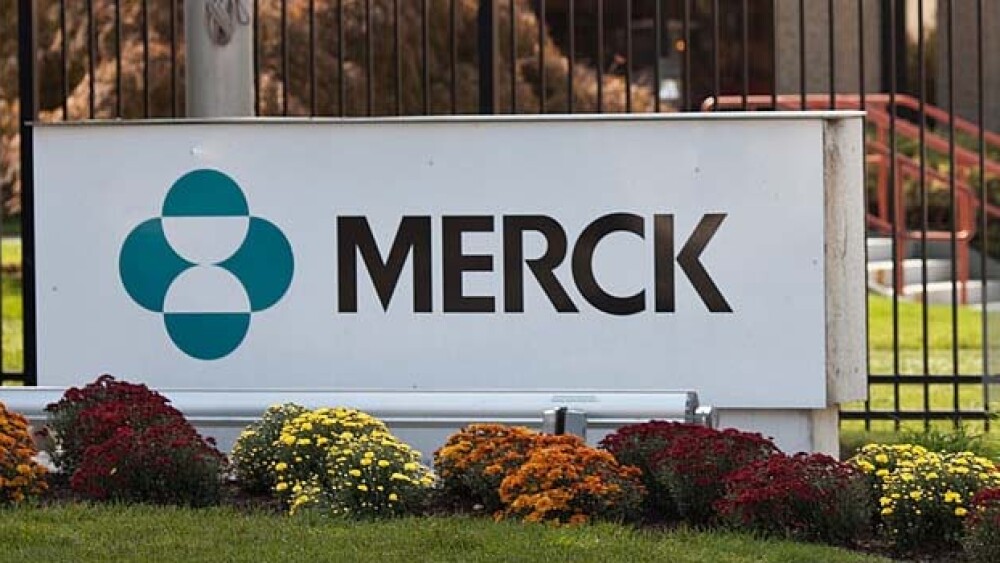Alzheimer’s drug development took another hit.
Alzheimer’s drug development took another hit. Merck & Co., announced it was halting protocol 019, its APECS Phase III clinical trial of verubecestat (MK-8931) in Alzheimer’s disease.
The company indicated that an external Data Monitoring Committee (eDMC) had recommended ending the trial after an interim safety analysis, saying that the likelihood of benefits didn’t outweigh the risks.
“We are disappointed with this outcome, especially given the lack of treatment options for patients suffering from Alzheimer’s disease,” said Roger Perlmutter, president, Merck Research Laboratories, in a statement. “We are grateful to the patients and caregivers who participated in this study, and despite this outcome, Merck remains committed to developing novel therapies for the treatment of Alzheimer’s and other neurodegenerative diseases.”
Verubecestat is a BACE inhibitor, a precursor to amyloid-beta, which is believed to be the leading cause of Alzheimer’s disease. However, a number of recent high-profile failures of antibodies that clear amyloid-beta has cast doubt on the amyloid hypothesis. Later in the disease, tau proteins accumulate in the brains of Alzheimer’s patients, but that has not been as intense a focus as amyloid clearance or prevention.
Merck didn’t provide much detail on what the eDMC was seeing safety-wise, or what kind of efficacy, if any, was observed, saying it expected to present data at an upcoming medical meeting.
John Carroll, writing for Endpoints News, observed, “Once one of Merck’s top late-stage drugs in the pipeline, its failure here will likely cast a dark shadow over other BACE drugs, including the one that Eli Lilly obtained from AstraZeneca as the UK giant backed out of CNS disease R&D.”
He also pointedly noted, “Alzheimer’s research has been an unrelenting disaster zone for 15 years, with nothing available to treat this disease aside from some marginal symptomatic therapies. Pfizer just abandoned neurosciences entirely, dropping its Alzheimer’s work along the way.”
Most companies aren’t giving up. Biogen is still emphasizing Alzheimer’s, Johnson & Johnson is continuing work, Denali is focused on it. And Merck also has therapeutics in development addressing tau proteins.
Pam Eisele, a Merck spokeswoman, told Bloomberg that the company hadn’t decided yet whether to end development completely on verubecestat.
Tim Anderson, an analyst with Sanford C. Bernstein & Co., was reported by Bloomberg to say, “Because the risk of failure is high, we have not been willing to give these compounds the benefit of the doubt. Neuroscience drug development is tricky, and Alzheimer’s disease is the trickiest of them all, it seems.”
One of the most recent failures was Axovant Sciences, whose intepirdine, which it acquired from GlaxoSmithKline for $5 million, failed in trials for Alzheimer’s in September and shortly afterwards for dementia with Lewy bodies (DLB). The company announced in January it was abandoning intepirdine. Yesterday it was announced that David Hung, formerly chief executive officer of Medivation who joined Axovant after Medivation’s sale to Pfizer, abruptly “resigned to pursue other opportunities.” The company’s chief operating officer Marion McCourt resigned, as well as company directors Kate Falberg, Tony Vernon and Patrick Machado.
Seamus Fernandez, analyst with Leerink, wrote in a note to clients about the Merck announcement, “While a disappointing development, we had always viewed this trial as a high-risk endeavor given the previous suspension of the Phase II/III EPOCH study in mild-to-moderate AD patients, along with historic failures of other drugs in this disease. Nevertheless, we had included $750 million in peak 2026E probability-adjusted sales for the drug in our model. Removing this brings our price target to $66 per share (from $67 per share).”





